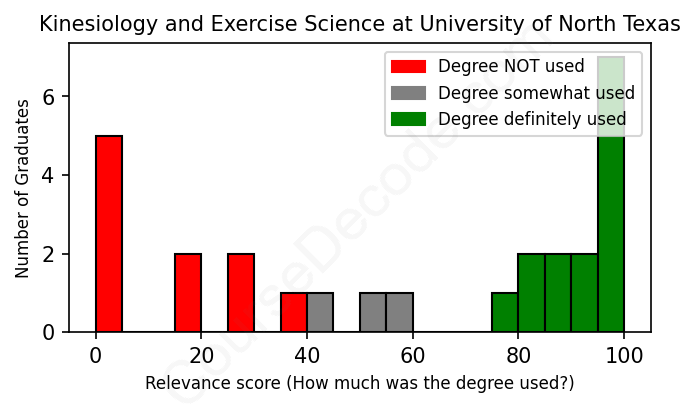
First, some facts. Of the Kinesiology and Exercise Science graduates from University of North Texas we've analyzed , here's how many have used (or NOT used) their degree in their career:

These are estimates based on AI analysis of 27 LinkedIn profiles (see below).
The verdict? Below average. Overall, with an average relevance score of 58%, Kinesiology and Exercise Science graduates from University of North Texas have a lower likelihood (-9%) of finding work in this field compared to the average graduate across all fields:
And for comparison, here's the chart for all profiles we've looked at across all degrees.
Also, after graduating, only 33% of these graduates have pursued further education other than another Bachelor's degree (such as a Masters degree or other), compared to the average across all profiles of 35%. This suggests a Bachelors degree is enough for most Kinesiology and Exercise Science graduates, and it's normal to look for work straight after graduation.
See the details:
|
Relevance score: 85% We think this person has gone into a career highly relevant to their degree. We think this person has gone into a career highly relevant to their degree.
DEGREE INFOGraduated in 2021 from University of North Texas with a Bachelor's degree in Kinesiology and Exercise Science. Also pursued further education since (see below). JOB HISTORY SINCE GRADUATIONApplied Sport Scientist Michael Johnson Performance Jul 2021 - Sep 2021 Head Coach  D1 TRAINING Nov 2021 - Oct 2023 Regional Manager  Kula Sports Performance Oct 2023 - Present FURTHER DEGREES DONE SINCE GRADUATINGMaster's degreeUniversity of North Texas 2022 - 2023 ABOUTHighly organized and energized coach with a continuous thirst for knowledge and ability to grow in the sports and coaching industry.Systematic and dependable critical thinker skilled in approaches that identify possible roadblocks, provide insights to solve problems and evaluate the effects of strategies implemented for a desired outcome.Compassionate and resilient leader with a detail-oriented mindset, self-motivated personality, and proven ability to execute with and without pressure, meeting deadlines and producing exceptional deliverables |
The top 10 most common jobs done by the graduates we've analyzed (ranked most common to least) are:
From the analysis of job trajectories of graduates from the University of North Texas with degrees in Kinesiology and Exercise Science, it looks like there’s quite a mix of relevant careers and completely unrelated ones. Many people land roles as personal trainers, exercise specialists, or coaches, which align directly with their studies and utilize their knowledge in physical fitness, human movement, and health. For instance, positions like Strength and Conditioning Coach, Exercise Technician, and even Behavior Technicians are examples where the skills acquired during their education come into play effectively.
However, it's interesting to see that a significant portion of these graduates step into roles unrelated to Kinesiology and Exercise Science—like bartending, sales, customer service, and even managerial positions in fields completely outside of fitness or health. Although these jobs can offer transferable skills, they don't directly engage with the physical health concept that these graduates studied. So, while there are some clear paths directly utilizing their background, it appears many end up in roles that don’t really reflect the core training they received. Overall, there’s a decent distribution between applicable career choices and those that sidestep the Kinesiology and Exercise Science relevance, making it a mixed bag for graduates in the field.
Here is a visual representation of the most common words in job titles for Kinesiology and Exercise Science graduates (this is across all Kinesiology and Exercise Science graduates we've analyzed, not just those who went to University of North Texas):

Graduates from the Kinesiology and Exercise Science program at the University of North Texas have a pretty mixed bag of career trajectories. When you look at their first jobs after graduation, many dive straight into roles that are relevant to their field, like personal trainers, strength and conditioning coaches, and support roles in health and fitness settings. A few, however, end up in jobs that feel a bit disconnected from Kinesiology, such as bartending or retail positions. Those who start with a focus on exercise and health tend to stick with it, moving into roles like exercise specialists, medical weight loss counselors, or various coaching positions, which is encouraging to see.
Fast forward five to ten years, and you can notice that while some do remain in the fitness and health domain, others branch out into different areas entirely. We see graduates transitioning into roles like health programs analysts, managers, or even teachers and coaches in schools, showcasing the versatility of their degree. It's clear that, for many, the foundational skills they gained allow them to pivot into related fields. However, it's also evident that not everyone stays within the realm of Kinesiology and Exercise Science, with several taking paths that may not have much to do with fitness at all. So, if you're passionate about health and fitness, this degree could definitely lead you there, but be prepared for some folks to get sidetracked along the way!
Honestly, pursuing a Bachelor’s degree in Kinesiology and Exercise Science can be a good mix of challenging and manageable, depending on your interests and strengths. At schools like the University of North Texas, you'll dive into subjects like anatomy, physiology, and biomechanics, which can definitely get technical, but if you’re into sports, fitness, or health, it can feel pretty rewarding and engaging. The workload isn't as light as, say, some general studies programs, but it’s not super heavy either compared to hard sciences like engineering or chemistry. So, if you’re passionate about the field, stay organized, and put in the effort, you’ll likely find it to be a fulfilling experience rather than a slog!
Most commonly, in the LinkedIn profiles we've looked at, it takes people 4 years to finish a Bachelor degree in Kinesiology and Exercise Science.
So, looking at these graduates from the University of North Texas, it seems like they're kind of all over the place when it comes to making decent money. Some early grads, like the ones who started as bartenders or fitness professionals, probably didn't pull in big bucks right away, especially the ones still working at similar roles with only small upward movements. On the other hand, you can see a few folks really moving up, especially those who shifted to roles in finance or management, which usually pay better. It's pretty clear that while some are doing well, others are still in jobs that might not be paying much more than a starter salary. Overall, it’s a mixed bag—some are flying high, but others are still figuring things out!
Here is a visual representation of the most common words seen in the "about" section of LinkedIn profiles who have a Bachelor degree in Kinesiology and Exercise Science (this is across all Kinesiology and Exercise Science graduates we've analyzed, not just those who went to University of North Texas). This may or may not be useful:

Here are all colleges offering a Bachelor degree in Kinesiology and Exercise Science (ordered by the average relevance score of their Kinesiology and Exercise Science graduates, best to worst) where we have analyzed at least 10 of their graduates: